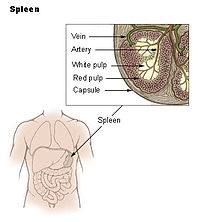
Photo from wikipedia
BACKGROUND Trauma/hemorrhagic shock (T/HS) causes a release of proinflammatory mediators into the mesenteric lymph (ML) that may trigger a systemic inflammatory response and subsequent organ failure. Recently, we showed that… Click to show full abstract
BACKGROUND Trauma/hemorrhagic shock (T/HS) causes a release of proinflammatory mediators into the mesenteric lymph (ML) that may trigger a systemic inflammatory response and subsequent organ failure. Recently, we showed that exosomes in postshock ML are biologically active mediators of this inflammation. Because the specific inflammatory mediators in postshock ML exosomes have yet to be characterized, we hypothesized that T/HS would lead to a distinct ML proinflammatory exosome phenotype that could be identified by proteomic analysis. We further hypothesized that their regulation by the neuroenteric axis via the vagus nerve would modify this proinflammatory profile. METHODS Male rats underwent an established T/HS model including 60 minutes of HS followed by resuscitation. Mesenteric lymph was collected before HS (preshock) and after resuscitation (postshock). A subset of animals underwent cervical vagus nerve electrical stimulation (VNS) after the HS phase. Liquid chromatography with tandem mass spectroscopy (LC-MS/MS) followed by protein identification, label free quantification, and bioinformatic analysis was performed on exosomes from the pre-shock and post-shock phases in the T/HS and T/HS + vagus nerve electrical stimulation groups. Biological activity of exosomes was evaluated using a monocyte nuclear factor kappa B (NF-&kgr;B) activity assay. RESULTS ML exosomes express a distinct protein profile after T/HS with enrichment in pathways associated with cell signaling, cell death and survival, and the inflammatory response. Stimulation of the vagus nerve following injury attenuated the transition of ML exosomes to this T/HS-induced inflammatory phenotype with protein expression remaining similar to pre-shock. Monocyte NF-&kgr;B activity was increased after exposure to ML exosomes harvested after T/HS, while ML exosomes from preshock had no effect on monocyte NF-&kgr;B expression. CONCLUSION Postshock ML exosomes carry a distinct, proinflammatory protein cargo. Stimulating the vagus nerve prevents the T/HS-induced changes in ML exosome protein payload and suggests a novel mechanism by which the neuroenteric axis may limit the systemic inflammatory response after injury.
Journal Title: Journal of Trauma and Acute Care Surgery
Year Published: 2019
Link to full text (if available)
Share on Social Media: Sign Up to like & get
recommendations!